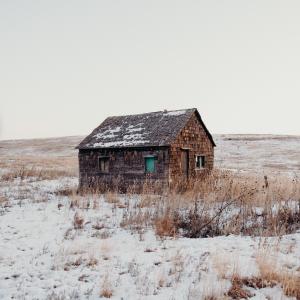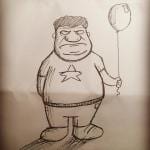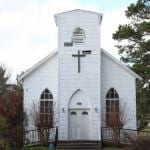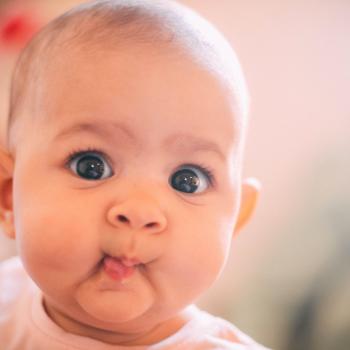My little girls and I finished Laura Ingalls Wilder’s The Long Winter yesterday. Like all of the Little House books so far—which, of course, I read ages ago but didn’t really remember—the kind of life they endured, by today’s American standards, is completely astonishing. Towards the end, it seemed they might as well have been living in Siberia. A diet of coarse brown bread, exhausted by the dark and cold, grinding hunger, grinding the diminishing bag of wheat in a coffee grinder, twisting stalks of wheat into tight bundles to burn in the stove because they had no wood, worn out by violent storms lasting into April.
Towards the end of the book, Almanzo and Cap go off into the bleak prairie, hoping the next storm will hold off, looking for rumored seed wheat, risking their very lives because the whole town is starving. There might be a farmer hunkered down in a sod house, no one knows for sure, and they are empowered by the owner of one of the two stores to buy it from him (almost) no matter the cost. They find the farmer, by crazy luck, and of course, he doesn’t want to sell but finally does. Almanzo and Cap make it back as the next storm is beginning to hurl itself against the town, and for four more days the Ingalls don’t know that the two succeeded, believing they were caught by the snow and wind, or didn’t find the man.
Mid-storm, after the girls have climbed into their icy beds, Mary asks Laura if she has prayed. They have this little exchange, which, I think, captures not just the religious feeling of all of the books, but much of American Christianity as well:
Under the quilts, Laura and Mary silently said their prayers, and Mary whispered, “Laura.”
“What?” Laura whispered.
“Did you pray for them?”
“Yes,” Laura answered. “Do you think we ought to?”
“It isn’t like asking for anything for ourselves,” Mary replied. “I didn’t say anything about the wheat. I only said please to save their lives if it’s God’s will.”
“I think it ought to be,” Laura said. “They were doing their best…”
Indeed, though Ma is so careful about making the girls learn the catechism, and attend to a much better level of instruction that any of us probably received, nevertheless, in one of the books, can’t remember which now, Ma or Pa or someone mouths that absurd extra-biblical absurdity that “God helps those that help themselves.” For a family apparently so Christian, they weren’t reading the Bible carefully enough to know that that unhelpful sentiment not only isn’t there, as Jared Wilson pointed out yesterday, but is contrary to the entire point of the text.
There are two sides to this untrue coin. On the one side, you have to try hard so that God will help you on those occasions that you don’t quite succeed, and on the other side, you mustn’t ask for help for yourself, but only for other people, because that would be selfish and wrong.
As I was reading The Long Winter out yesterday, I paused to lecture all my children that they had better not adopt this attitude. The very first person you should pray for is yourself, I said, because you are helpless, and if you don’t beg God for help, your life will be really horrid. It might be horrid anyway, and so, all the more reason to ask, or even to beg, for food, for shelter, for hope, for all the things the Ingalls, in particular, so desperately needed.
And God did help them, I guess, because they helped themselves and so, at the end of the winter, Pa can stand up and rejoice that they endured. The winter didn’t lick them. They worked wretchedly hard, and they overcame. I’m sure he also thanked God, but the ordinary reader is certainly going to remember that it was they who pulled together and pulled through, and God was there, being sovereign, but not so helpful as one might wish.
The trope, “God helps those who help themselves,” is deeply embedded in the psyche of almost everyone. It comes out in the subtlest ways, in the guilt that people express over praying for themselves, the quick eagerness to say that a lot of prayers have been offered for other people, and also material care, so that, perhaps this once, God will hear a prayer for me as well. As if the selfishness of the human heart will be masked, or hidden, by the plentiful prayers offered up for other people, and all the good works, and God will not notice that you, his creature, is yet going to die, and is poor, and did not keep the law.
There are many things I would like to kill off about American “Christianity,” and this is the chief one. The helplessness of the human creature before death is so hidden by—as someone clever said to me this weekend—nursing homes and hospitals and the complete absence of physical suffering. We have organized society so neatly that the touch of a button, the scroll of a finger produces every desire, fulfills every inclincation. Never have ordinary human people had such godlike power over their circumstances. And yet, even so, the intense suffering of life and the specter of death, whether we are able to see it face to face or not, never do cut through the human desire to be acknowledged by God for power, for effort, and most of all for a goodness that none of us actually possess. And so we go on forever, “helping ourselves,” until we are none of us left.
No, pray for yourself. Beg God to take you into a warm, comfortable life that lasts forever. Ask him to meet all of your needs. Beg him to forgive you your sins. And then pray for others as well. He helps those who can’t help themselves. That’s what “help” means.












